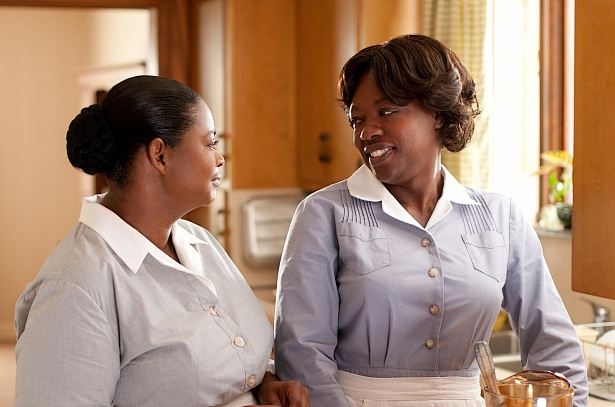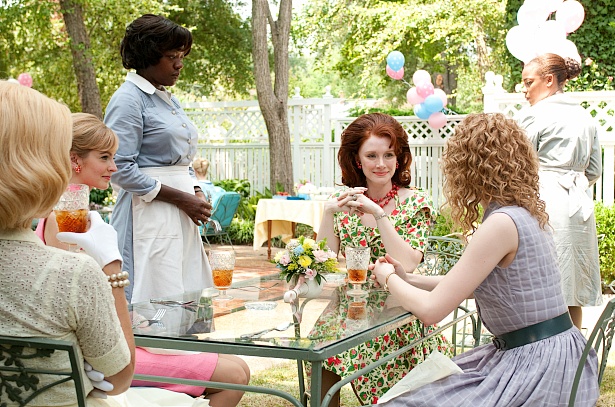In a blink and you’ll miss it moment, we see that Emma Stone’s character Skeeter has a copy of To Kill a Mocking Bird on her bookshelf. Similar to Harper Lee’s story, The Help also deals with racial inequality, class and courage.
Already a huge success in the US, it climbed to the #1 spot in its second week and saw off blockbusters to stay at the top for three consecutive weeks. Having already earned over $160 million stateside (against a production budget of $25 million), its success has been attributed to strong word of mouth (which it will most likely find here), and a middling amount of controversy. Or maybe people just thought, “Ooh, racism in a mainstream film? I’ll have me some of that!”
Based on Kathryn Stockett’s best selling novel, The Help is set in Jackson, Mississippi during the early 1960s. Skeeter Phelan (Emma Stone) has just graduated with a degree in journalism. Instead of getting married and making babies like the rest of her friends, she gets a job writing a cleaning advice column for the Jackson Journal. When meeting her friends Hilly (Bryce Dallas Howard) and Elizabeth (Ahna O’Reilly) for a game of Bridge, Hilly mentions that she plans to head up an initiative to have the African American maids of Jackson using separate toilets, because they carry “different diseases.” From seeing the way Elizabeth and her husband treat their maid Aibileen (Viola Davis), and missing her own maid Constantine (Cicely Tyson), who has mysteriously left, Skeeter decides to write a collection of stories from the point of view of ‘The Help’; the black maids that spend their entire lives working for white families and looking after their children. Struggling to find a maid that’s willing to talk (because it’s against the law), Aibileen is the first to share her experiences. It’s not long before Hilly’s maid Minny (Octavia Spencer) walks in on Skeeter interviewing Aibileen. Thinking that they’re both crazy, she also agrees to help.
Featuring flawless performances from almost everyone, it’s small reactions or gestures that end up saying more about these characters. Viola Davis narrates as Aibileen, going through the motions of domestic servitude. She is intentionally emotionless when working, except for when looking after Elizabeth’s daughter Mae. Only after taking up the risk of telling her story does she perk up. At one point Skeeter is surprised to see Aibileen laugh, as if it’s a revelation.
Octavia Spencer as Minny leaves a lasting impression; often letting her actions do the talking (never before has a toilet flush been so poignant). Jessica Chastain has absolutely exploded this year and her role as the ditzy, but well-meaning Celia Foote, who is shunned after marrying Hilly’s former boyfriend, adds to her successive streak.
Rising star Emma Stone is great in her role, as if she just might be one of the few people in Jackson with some sense. For a young woman in the 1960s, she also happens to be very outspoken, working, and is initially careless in her own confidence. A subplot involving her relationship with a narrow-minded boyfriend (Chris Lowell) survives from the novel, but seems wasted here and pads the two-hour-plus running time. Yet his inclusion reminds the audience that she’s different because she says exactly what she’s thinking. Skeeter’s reaction upon finding out what actually happened to her former maid Constantine was the only point at which I was reminded that I was in a cinema, due to just how overly sentimental the scene plays.
Bryce Dallas Howard is brilliantly evil as mega-bitch Hilly Holbrook. Selfish, spoilt and prone to having things her way, she says in complete seriousness, “You are not to joke about the colour situation,” and later tells her maid Minny to go out and use the maid’s bathroom during the middle of a tornado. Defined by small nuances, she watches silently as the police arrest one of her maids (a scene that caused a shriek of gasps amongst the audience), drinks while driving and jerks her head to signal that she doesn’t even want Skeeter sitting next to her. This is a career-defining role.
Being the head of the local Junior League means that Hilly also has her own little stereotypical clique, one that’ll probably remind you of the people you’d avoid at school. What a clique loves to do more than anything is gossip (often about Celia), yet they also have a ‘keeping up with the Joneses’ mentality, as Aibileen tells us that, “Once Miss Hilly had a baby, every girl at the Bridge table had to have one.” You start to wonder if the women even care for their own children or just see them as a hindrance (or maybe even a fashion accessory), since ‘the help’ mostly look after them. With the exception of Skeeter and her mother, we very rarely see a white woman talking to her own child, and the only moment I can recall is one of discipline.
Turns out that both Kathryn Stockett and director Tate Taylor happened to grow up in Jackson, Mississippi. That they’re both good friends may have helped Taylor nab the directing gig. Despite only having helmed one other feature, Taylor has a firm grasp of the material and constructs the film as feel-good entertainment, which isn’t all that easy given the subject, yet he succeeds. And if you don’t feel good, you’ll at least be left with something to say.
Having attracted a fair amount of controversy, some argue that the film trivialises the issue when it comes to the treatment of African American maids. Yet this isn’t trying to be Cry Freedom or Mississippi Burning. It gets its message across without the need to shock its audience. While it appears to be largely faithful to the novel, the film is taking the majority of the brunt, in that it avoids giving black feminism the means to stand up for itself. The maids may be the crux, but their pivotal role is diminished because they need the help of a white girl. Could their stories really have been published without Skeeter’s help?
To certain audiences, it’s empathic to a point and though you can guess the outcome before it starts, there’s an unexpectedly good mix of laughs and tears along the way, boosted by strong performances all round. Seeing a small minority of people working together regardless of who they are turns out to be engrossing and uplifting. It’s highly likely that it’ll end up clutching a number of Oscar nominations next year (Best Picture for sure). Such is the quality of the film that whatever Tate Taylor does next will have the words, “From the director of The Help,” emblazed upon it.
Originally published on MCM Buzz on 21 October 2011.





